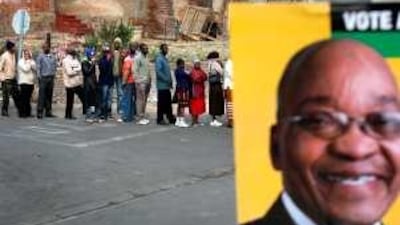Yesterday in South Africa, the reign of a moral giant (Nelson Mandela) followed by the rule of an aloof technocrat (Thabo Mbeki) officially gave way to the dominion of a man (Jacob Zuma) who has helped tarnish the "Rainbow Nation", perhaps beyond repair. It is not only Mr Zuma's well-publicised Bring Me My Machine Gun serenade that gives pause. Or that his supporters in the ruling African National Congress took to labelling his opponents "cockroaches" and "snakes" during the latest campaign - the same smears that stoked the fiery hatred leading up to the 1994 Rwandan genocide and are tantamount, in South Africa's worsening economic times, to pouring gasoline on fire.
It is rather that the 67-year-old Mr Zuma appears so poorly disposed to repair the moral taint that pervades the government and party he now leads. Graft charges against him involving an arms deal worth $5 billion (Dh18bn) were dismissed on a technicality this month, but doubts about his innocence persist among many South Africans - hardly the shining moral example the country needs at a time when it is rife with crime, corruption and cronyism.
Also, Mr Zuma was acquitted of rape charges three years ago, but he outraged many when he admitted having unprotected sex with his accuser, whom he knew to be HIV-positive. In his defence, Mr Zuma said he "had taken a shower afterward". That Mr Zuma is hardly alone in subscribing to this widely held myth might make his ignorance easier to understand - except that at the time, he was head of the National Aids Council in a country where one out of every six people is infected with HIV.
Furthermore, a study by Harvard University last year blamed the ANC government in which Mr Zuma served as deputy prime minister for the Aids deaths of more than 343,000 South Africans. Yet despite the appearance of indiscretion that surrounds him, Mr Zuma will win handily. He will now take over from Kgalema Motlanthe, the caretaker president, as the leader of Africa's richest and most developed country. He also will serve as the official host at next year's football World Cup.
The explanations for Mr Zuma's electoral success stem from the heart of South Africa's recent, turbulent history. One answer is his personality. Unlike the wonkish, diffident Mr Mbeki, he is a glad-handing populist - an "old-fashioned Zulu warlord", as one South African put it recently. Another explanation is that for South Africa's black and poor majority, the debate over the morality and immorality of the ANC and its leaders pales in significance next to the party's leading role in toppling apartheid.
The ANC seldom fails to remind South Africans about this role, which created a vast reservoir of credibility that is far from running dry. Mr Zuma's victory is, finally, a testament to the ANC's control of most, if not all, the levers of power of the South African state. Specifically, the black majority relies for most of its information on the powerful state-owned South African Broadcasting Corp.
The debate about crime, corruption and sexual peccadilloes is primarily a middle-class debate limited to the newspapers that the middle-class reads. The cloud of impropriety that dogs Mr Zuma and the ANC was likely to cost them key middle-class support at the polls yesterday. Some believe this erosion - possibly costing the ANC its critical two-thirds majority in parliament and its ability to suppress investigations into its dealings - will be the country's gain and lead to a more vibrant democracy.
Others worry that the opposite will occur. Less-than-expected support for the ANC will threaten its overweening sense of historical destiny and reinforce the paranoia, conspiracy-mongering and other intriguing that churns among its senior leaders - a legacy of their years in exile. (As the movement's former spy chief, Mr Zuma is one of the party's most experienced schemers.) Along with a tightening economy, the pressure on the ANC to appease its core supporters could become inexorable. Bill Douglas, a Johannesburg shop owner, believes the temptation to follow the path of another African liberation movement will then prove irresistible to the ANC.
"We're going down like Zimbabwe," said Mr Douglas, alluding to Zanu-PF, the ruling party next door, and its self-declared president-for-life, Robert Mugabe. "'Take the white man's farm,' they'll say." This scenario saddens more than angers Mr Douglas, 78, who was born near Wimbledon in London and emigrated to South Africa in 1947 with his mother ("I've sat through two bloody wars. I'm leaving," she told him.) Not even the iconic Mr Mandela can stop the eclipse of the "Rainbow Nation" and what is once seemed to epitomise, Mr Douglas said. "Madiba," as he is affectionately known, is now 90 and said to be losing his memory and be nearly deaf.
Furthermore, out of a sense of fidelity to their shared sufferings and triumphs, there is little prospect that Madiba will denounce the improprieties of fellow ANC members, who still publicly refer to each other as "comrade" and who, after yesterday, boast a president that once declared that the ANC will "rule South Africa until Jesus comes back". For South Africa's future, Madiba's dwindling twilight is heart-breaking, Mr Douglas said, his voice wistful.
"We've produced one saint and one saint only. If he were 30 years younger, we might have a chance." cnelson@thenational.ae

